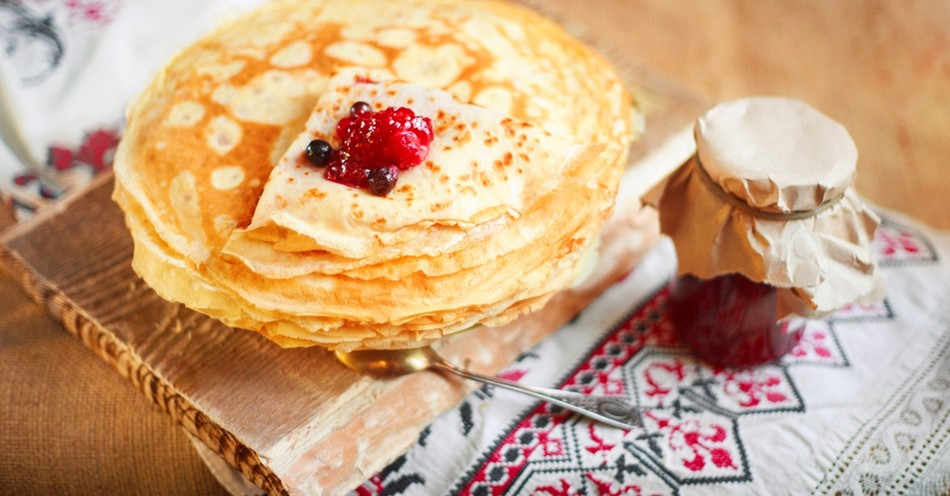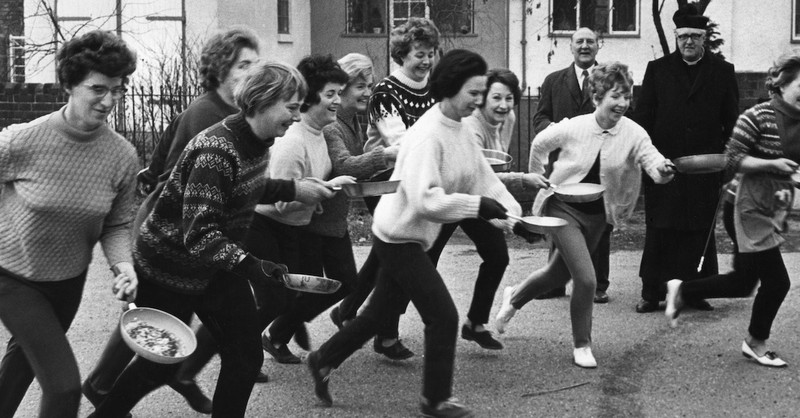Shrove Tuesday serves multiple purposes: encouraging Christians to repent of their sins before the start of Lent on Ash Wednesday and also giving them the opportunity to partake in a last round of jubilation before the beginning of the austere Lenten season, which is characterized by making a Lenten sacrifice, fasting, praying and several spiritual disciplines, such as checking a Lenten calendar and reading a daily devotional.
Shrove Tuesday is associated with various traditions and customs in different cultures. Some of the common traditions include:
Eating Pancakes and Other Festive Foods: Of course, one of the most widely known traditions is the consumption of pancakes! People make and enjoy pancakes on Shrove Tuesday as a way to use up ingredients like eggs, milk, and sugar before the fasting period of the 40 days of Lent. Liturgical fasting calls for eating simpler food while abstaining from meat, dairy products, or eggs.
- Pancake Day (UK & Commonwealth Nations): Many enjoy stacks of pancakes as a way to use up rich ingredients like eggs, butter, and sugar before Lent.
- King Cake (Mardi Gras in the U.S., especially New Orleans): A colorful, ring-shaped cake with a hidden baby figurine, symbolizing good luck and faith.
- Faschingskrapfen (Austria & Germany): Jam-filled doughnuts enjoyed during pre-Lenten celebrations.
- Pączki (Poland & Polish communities in the U.S.): Rich, deep-fried pastries similar to jelly doughnuts, eaten in abundance on Pączki Day (Shrove Tuesday).
Pancake Day Races: Pancake Day races are a fun and quirky Shrove Tuesday tradition, especially popular in England. These races involve participants—often wearing aprons and headscarves—running while flipping a pancake in a frying pan. The goal? Make it to the finish line without dropping your pancake!
The most famous Pancake Day race takes place in Olney, England, and dates back to 1445. According to legend, a woman was busy making pancakes when she heard the church bells ring for the Shrove Tuesday service. In a rush, she ran to church—still holding her frying pan with a pancake inside! The tradition stuck, and today, runners flip their pancakes at least three times as they race to the finish line.
The picture above is of housewives in Whittington, England, practicing for their Shrove Tuesday pancake race. Mrs Brenda Hood (extreme left), winner o the last two event, who was confident of completing a hat-trick on her way to the finish line.
Confession and Absolution: The name "Shrove Tuesday" comes from the word "shrive," which means to confess and receive absolution for one's sins. In the Christian tradition, some individuals attend church services for confession and spiritual preparation before the start of Lent.
Feasting and Celebration: Shrove Tuesday is often seen as a day of celebration and indulgence before the more solemn season of Lent. People may gather with family and friends to enjoy a festive meal or participate in various activities and events organized by communities.
Mardi Gras Festivities: In many regions, especially those influenced by French culture, Shrove Tuesday is celebrated as Mardi Gras, which translates to "Fat Tuesday." Mardi Gras is known for elaborate parades, colorful costumes, lively music, and street celebrations. This tradition is particularly prominent in places like New Orleans.
Carnival Celebrations: In some countries and regions, Shrove Tuesday is part of the larger Carnival season. Carnival often involves elaborate costumes, masquerade balls, and street processions. The festivities may continue until midnight, marking the beginning of Lent on Ash Wednesday.
On Shrove Tuesday, the final day of the Shrovetide season, many Christians, such as Anglicans, Lutherans, Methodists, and Roman Catholics, have an emphasized focus on self-examination, reflecting on what sins they need to repent for and what improvements in life or aspects of spiritual growth they need to ask God's help in edifying.
Additionally, many Christians conclude their determination of what Lenten sacrifices they will make for the 40 days of Lent on Shrove Tuesday. While undergoing a Lenten sacrifice, it is helpful to pray for strength and encourage fellow Christians in their fast saying, for example: "May God bless your Lenten sacrifice."
Photo Credit: Getty Images/Mirrorpix / Contributor








.jpg)